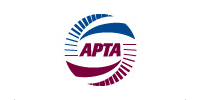
CEOs of large, mid-size and small public transportation systems sounded the alarm for the urgent need to increase infrastructure investment in one of America’s most valuable assets – its public transportation systems. The national press conference call was a part of this year’s National Infrastructure Week (NIW), which is being held May 16 – 23.
The Federal Transit Administration (FTA) cited an $86 billion backlog in deferred maintenance and replacement needs with more than 40 percent of buses and 25 percent of rail transit assets in marginal or poor condition, according to the latest data from 2013. At the same time, with ridership increasing by 37 percent since 1995, public transit systems are challenged to increase service and capacity.
“After decades of inadequate investment, the American public transportation infrastructure is crumbling,” said American Public Transportation Association (APTA) Chair Valarie J. McCall, who serves on the board of the Greater Cleveland Regional Transit Authority(GCRTA). “This neglect demands attention at all levels of government so that public transit can continue to help grow communities and businesses.”
In addition to McCall, the following leaders detailed the challenges with inadequate infrastructure investment: Richard White, APTA Acting President and CEO; Joseph Calabrese, President and CEO of GCRTA; Dorval Carter, President and CEO of the Chicago Transit Authority; Jeff Hamm, Executive Director and CEO of the Clark County Public Transportation Benefit Authority (WA); Jeffery Knueppel, General Manager, Southeastern Pennsylvania Transportation Authority; Dennis Martin, Interim Executive Director, NJ Transit; Ellen McLean, CEO of the Port Authority of Allegheny County; Ed Reiskin, Director of Transportation of the San Francisco Municipal Transportation Agency; and Paul Weidefeld, General Manager and CEO of the Washington Metropolitan Area Transit Authority. Edward Mortimer, Executive Director of Transportation Infrastructure for the U.S. Chamber of Commerce, also participated.
“As public transportation has experienced tremendous growth over the last two decades, public transit systems are struggling to maintain aging and outdated infrastructure while at the same time being challenged to expand capacity,” said APTA Acting President and CEO Richard White. “While Congress’s passage of the federal FAST Act was a step in the right direction, the job is still not done because we are woefully behind in investing in our infrastructure. Estimates to meet current national public transportation demand will require a capital investment of $43 billion annually over six years by all levels of government. Currently, the U.S. invests $17.7 billion annually.”
A number of other public transportation agencies nationwide are participating in NIW as members of APTA, which is an affiliate member. National Infrastructure Week is the largest, most diverse, non-partisan coalition of organizations dedicated to strengthening America by rebuilding the nation’s infrastructure. This year’s fourth annual National Infrastructure Week brings together America’s business, labor and policy-making leadership, and it includes more than 100 affiliate organizations from all sectors of America’s economy and society.
Below are brief quotes from participants in the National Infrastructure Week press conference call held by APTA. In addition, we are providing fact sheets for some of the systems which highlight the impact of American disinvestment in America’s public transportation infrastructure. For more information about NIW, go to www.infrastructureweek.org.
Quotes from press conference call participants:
Joseph Calabrese, CEO/General Manager, Greater Cleveland Regional Transit Authority
About American Public Transportation Association (APTA)
APTA is the leading force in advancing public transportation. Their mission is to strengthen and improve public transportation. APTA serves and leads its diverse membership through advocacy, innovation and information sharing. APTA and its members and staff work to ensure that public transportation is available and accessible for all Americans in communities across the country.




Comments
There are no comments yet for this item
Join the discussion